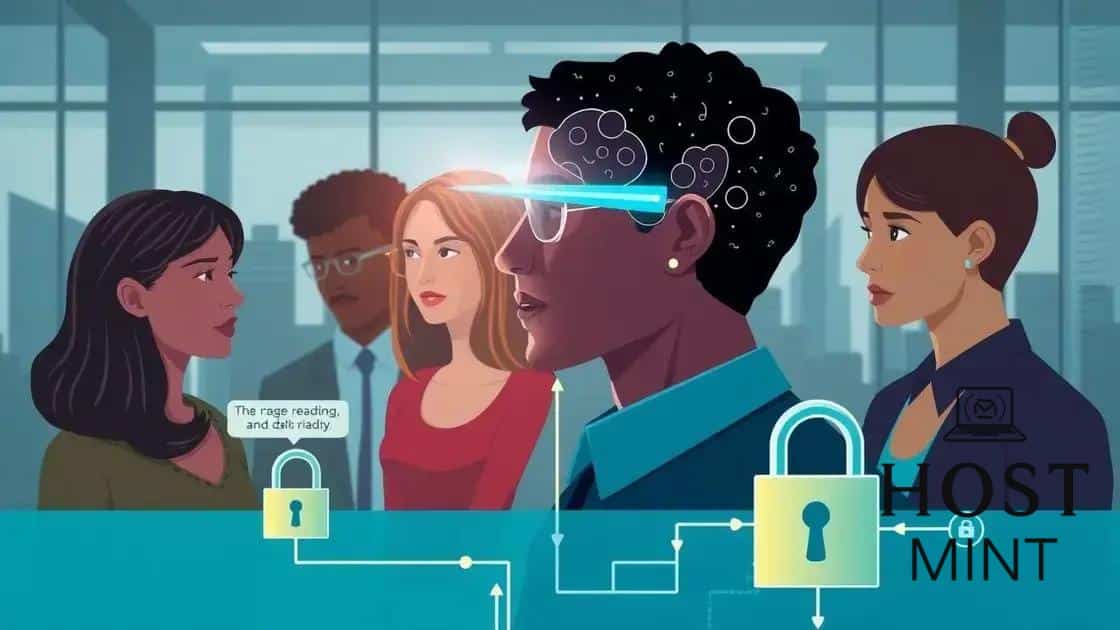Ethical implications of brain-computer interface devices

Ethical implications of brain-computer interface devices include concerns about privacy, informed consent, and the potential impact on identity and autonomy, necessitating careful regulation and responsible use.
Ethical implications of brain-computer interface devices are becoming increasingly relevant as technology advances. Have you ever considered how these devices might affect your privacy and choices? Let’s dive into this captivating topic.
Understanding brain-computer interfaces
Understanding brain-computer interfaces is essential as technology continues to evolve. These devices enable direct communication between the brain and external devices, allowing users to control gadgets just by thinking. Imagine a world where you can navigate your computer or adjust your home lights without any physical action. This exciting technology has significant implications.
What Are Brain-Computer Interfaces?
Brain-computer interfaces (BCIs) are systems that convert brain signals into actions. They work by detecting electrical activity in the brain, often through non-invasive methods like EEG. Once the brain signals are interpreted, they can be used to control devices, making them incredibly powerful tools for individuals with mobility impairments.
How Do They Work?
BCIs rely on advanced algorithms to interpret neural signals. The system learns to recognize specific patterns associated with different thoughts or intentions. This learning process enables more accurate control over time. For example, a user might think about moving their hand to move a cursor on a screen.
The technology behind BCIs includes:
- Signal acquisition: Collecting data from brain activity.
- Signal processing: Analyzing the acquired signals to interpret user intent.
- Control interface: Translating the interpreted signals into actions.
As researchers continue to make advances, the capabilities of BCIs are expanding, paving the way for innovative applications in medicine, gaming, and personal communication.
Moreover, BCIs hold promise in aiding those with neurological conditions. They can help restore lost functions and improve quality of life. For instance, in rehabilitation, these devices can assist stroke patients in regaining movement control by linking their thoughts directly to movement in a therapeutic setting.
Potential Risks and Concerns
While the potential benefits are enormous, there are also **ethical implications** associated with BCIs. As these devices can read thoughts, concerns over privacy and informed consent arise. Users must be fully aware of how their brain data is being used, raising questions about data security.
In the quest for deeper understanding, we must also consider:
- The impact on personal autonomy.
- The potential for misuse of brain data.
- Regulatory frameworks to protect users.
Understanding brain-computer interfaces is not just about the technology but also about how it fits into our lives and society. As advancements continue, so does the dialogue around their ethical use and implications.
Privacy concerns with mind-reading technology

Privacy concerns with mind-reading technology have been growing as brain-computer interfaces become more sophisticated. As these devices can potentially interpret thoughts, the implications for personal privacy are significant. It raises a critical question: how much of our inner thoughts should be accessible to others?
Understanding the Risks
One of the main privacy risks associated with brain-computer interfaces is the potential for unauthorized access to users’ thoughts. This technology can record neural data, which may contain sensitive information about an individual’s intentions, feelings, or memories. With such information, the risk of misuse increases dramatically.
Potential Misuse of Data
The data collected by BCIs can be incredibly personal. If it falls into the wrong hands, it may lead to:
- Manipulation of thoughts or emotions.
- Invasion of privacy, where companies or governments monitor mental activities.
- Discrimination against individuals based on their thoughts or medical conditions.
As technology evolves, so do the methods of protecting this invaluable data. Rigorous regulations and ethical guidelines are essential to prevent abuse of BCIs.
Another concern is informed consent. Users must fully understand what they are agreeing to when they use these interfaces. It’s important for developers to communicate clearly how the technology functions and what type of data it collects. Failure to do so undermines trust and leads to ethical dilemmas surrounding user autonomy.
Legal Implications
As with any emerging technology, legal frameworks are lagging behind the advancements in BCI technology. Current laws may not cover the unique challenges posed by mind-reading devices, leading to potential legal grey areas. Regulations must evolve to address these challenges, ensuring that users’ privacy is safeguarded adequately. Policymakers will need to consider how to classify mental data and create comprehensive protections.
In conclusion, as we embrace the advancements of brain-computer interfaces, addressing the privacy concerns will be crucial in shaping the future of this technology. Protecting users from unwanted access to their thoughts will not only foster trust but also ensure the ethical propagation of incredible innovations. Maintaining a balance between innovation and privacy is paramount.
Ethical dilemmas in brain-computer interface usage
Ethical dilemmas in brain-computer interface usage are becoming a hot topic as these devices become more widespread. The ability to read and interpret brain signals brings amazing opportunities, but it also raises significant ethical questions. How do we balance the benefits of these technologies with the potential risks?
Understanding Ethical Dilemmas
One of the primary ethical concerns with brain-computer interfaces (BCIs) is the issue of consent. Users must fully understand what they are agreeing to when using these devices. Are they aware that their thoughts could be read and interpreted? Ensuring that they provide informed consent is essential.
Impact on Identity and Autonomy
Another ethical dilemma involves personal identity and autonomy. If a BCI can control a device through thought alone, does that blur the line between human and machine? Users may feel a loss of control over their own thoughts and actions. This raises questions about free will and the essence of what it means to be human.
The potential impact on identity can include:
- A sense of dependency on technology.
- Altered perceptions of self and others.
- Challenges in distinguishing between human choices and machine influences.
Furthermore, BCIs may inadvertently change how people communicate and interact with one another. The way we express thoughts could shift dramatically, leading to changes in social norms.
Accessibility and Inequality
BCIs also raise issues of accessibility and inequality. If these devices become available only to certain segments of the population, this could widen the gap between different social groups. Those without access may struggle to keep up with advancements in technology, leading to further inequality.
As we explore the ethical dilemmas associated with brain-computer interfaces, it’s clear that these devices have the potential to reshape our world. It is crucial to consider who gets access to these technologies and how they might affect societal dynamics.
Balancing the ethical implications of brain-computer interfaces while harnessing their capabilities will require careful thought and ongoing dialogue within society.
Impact on mental health and society

Impact on mental health and society is a crucial aspect to consider as brain-computer interfaces (BCIs) become more prevalent. These devices can influence how we think, feel, and interact with each other. As they continue to develop, their effects on mental health and social structures will be significant.
Mental Health Considerations
BCIs have the potential to offer revolutionary treatments for mental health issues. For instance, individuals suffering from depression or anxiety may find support through devices that assist in mood regulation. By detecting brain signals related to these conditions, BCIs could help tailor therapies more effectively.
Risks of Dependency
However, there are also potential risks. Users might become dependent on these devices for emotional well-being, which could lead to diminished coping skills. This dependency raises questions about how we form emotional connections and manage our mental health without technological support.
Moreover, the impact of BCIs on social interactions cannot be overlooked. As individuals rely more on these devices, traditional methods of communication may degrade. For example:
- Face-to-face conversations could decline, leading to isolation.
- Increased reliance on technology might hinder the development of empathy.
- Social skills could diminish as individuals adapt to communicating through BCIs.
As we explore the implications of brain-computer interfaces, it’s clear they can reshape not only our mental health landscape but also the fabric of society. The balance between leveraging their benefits and managing the potential downsides is essential for positive outcomes.
Additionally, understanding the societal impact of BCIs requires consideration of how they will be integrated into daily life. The disparities in access could create new divisions, affecting how different groups interact with technology and each other.
Regulations and future prospects
Regulations and future prospects are essential aspects to explore as brain-computer interfaces (BCIs) develop rapidly. With new technologies come new responsibilities. It is crucial to establish frameworks that ensure ethical usage while maximizing the benefits of these devices.
Current Regulatory Landscape
As of now, regulations for BCIs are still in their infancy. Many countries lack specific laws addressing the unique challenges posed by these technologies. Traditional regulations governing medical devices and data privacy may not fully apply, creating gaps that could lead to misuse or harm.
Need for Comprehensive Guidelines
To address these challenges, a set of comprehensive guidelines is necessary. These guidelines should cover:
- Informed consent processes that ensure users understand the risks and benefits.
- Data privacy protections to keep users’ thoughts and personal information secure.
- Standards for device safety and efficacy to protect users from harm.
Engaging stakeholders—including ethicists, technologists, and the general public—will be vital in forming these regulations. By including diverse perspectives, the resulting frameworks can better reflect societal values and concerns.
Looking ahead, the future of BCIs is promising. Innovations may make them more accessible to a broader range of users. For instance, researchers are exploring ways to create affordable BCI devices that can assist people with disabilities.
Potential Advances in Technology
The evolution of BCIs could lead to breakthroughs in various fields, including medicine, education, and entertainment. Examples of future applications might include:
- Restoring mobility for individuals with paralysis through brain-controlled prosthetics.
- Enhancing learning experiences through direct brain-to-computer interfaces.
- Creating interactive gaming environments that respond to users’ thoughts.
As research advances, it will be essential to maintain a focus on ethical considerations. Balancing innovation with ethical guidelines will determine the societal impact of brain-computer interfaces moving forward.
FAQ – Frequently Asked Questions about Brain-Computer Interfaces
What are brain-computer interfaces (BCIs)?
BCIs are systems that allow direct communication between the brain and external devices, enabling users to control technology with their thoughts.
What are the potential benefits of BCIs for mental health?
BCIs can help treat mental health conditions by providing personalized therapies that detect and respond to brain signals related to emotional well-being.
What ethical concerns are associated with BCIs?
Ethical concerns include issues of privacy, informed consent, and the potential for dependency on technology for emotional support.
How can regulations help ensure the responsible use of BCIs?
Establishing comprehensive regulations can protect user privacy, ensure informed consent, and promote equal access to brain-computer interface technologies.






